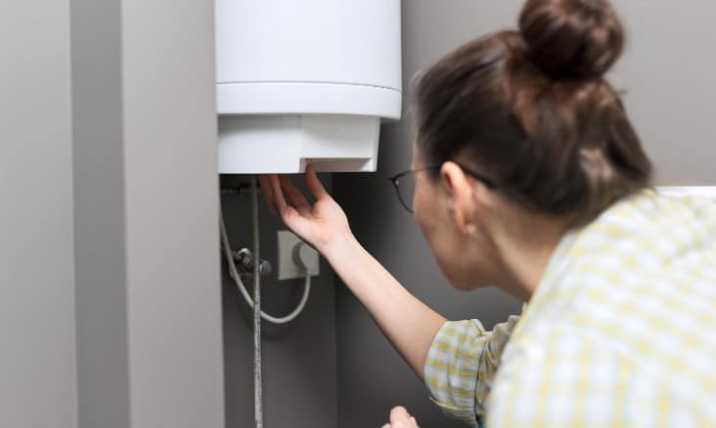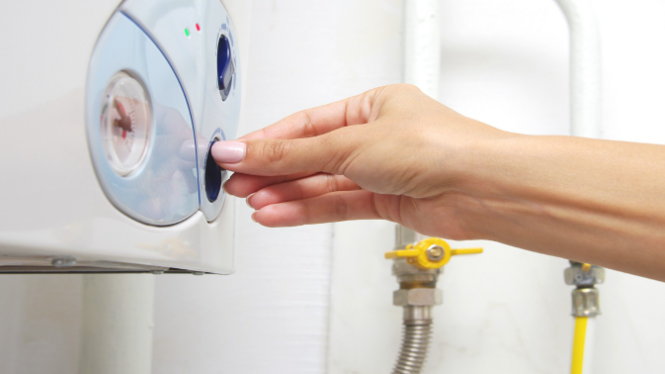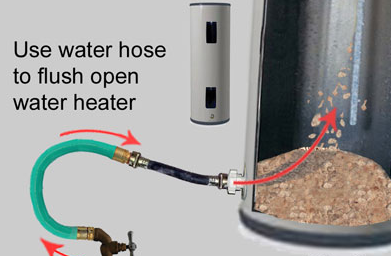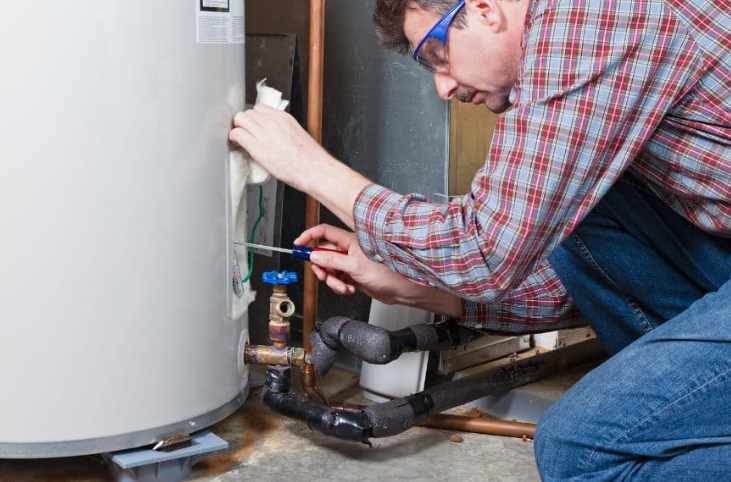Is hot water heater knocking dangerous? It isn’t always a terrible thing, but it’s vital to understand the differences between the various sounds and how they affect the functionality and safety of your water heater.
Is hot water heater knocking dangerous? Will be discussed in this post. Also, why is your water heater knocking, and what can you do about it if it happens?
5 Water Heater Sounds You Should Know

1 – Gurgling
Electric water heaters are notorious for making crackling and hissing noises. These noises are every day in electric heaters, so if yours makes a crackling sound now and then, it’s probably not a tremendous concern. If the noises continue, something may impede your system’s heating element.
A more significant problem may be draining your tank and calling an expert to assess if gas or oil powers your water heater instead of electricity. Moisture may be to blame for the crackling noises.
Whether you hear these noises coming from your gas/oil water heater, call a professional to see if there is water gathering around your unit. It doesn’t matter if your water heater runs on electricity or not, it still needs the power to operate, and you don’t want water to interfere with its electrical components.
2 – Banging
The sounds of a water heater include banging and rumbling. Excess sediment build-up is usually to blame for these noises. When enough sediment builds up in your water heater tank, it might react with the heating element, causing the mini-explosions you’ve been hearing. It is usually an easy problem to tackle. Also, you can resolve this problem by draining your water heater tank – something you should do at least once a year assuming you don’t have a tankless system.
There’s also the possibility that your unit suffers from a water hammer, which happens when you turn off the water and then water flows back through the pipes. Because water hammers can cause pipes to burst, utilize a pressure-reducing valve to lower the pressure in your system and eliminate the noise. You can also hire a professional to check for a water hammer and drain your water heater tank.
3 – Moving slowly
Hearing ticking from your water heater is quite terrifying, as if it’s about to explode like a bomb. Fortunately, things aren’t quite as bad as they appear. If you hear a ticking noise emanating from your water heater, it’s probably due to a sudden drop in water pressure.
If you keep hearing this noise, locate the pressure-reducing valve and adjust the pressure level on your water heater. You may also want to add extra straps/insulation around your water heater to keep it from moving and being influenced by water pressure variations. Call a technician if the ticking noise continues.
4 – Popping
Popping, like banging, indicates that there is too much sediment in your water heater tank. You may hear the alkali in your water interact with the heating element. Alkaline contains a lot of calcium and magnesium, which generates rust, one of the most common reasons for sediment build-up.
If you hear this noise, replacing your heater’s anode rod (the component that minimizes sediment and bacteria build-up) may also help you reduce rust build-up. If you live in a location with hard water, installing a water purification system may also help you reduce rust build-up.
5 – Squawking
The most common cause of a high-pitched squealing or whistling sound coming from your water heater is loose valves allowing air to escape. Please double-check your pressure-releasing valves and your system’s temperature valves and inlet/outlet valves (refer to the manufacturer’s manual to determine where these components are on your device). If you cannot adjust the valves on your own, contact a technician.
What Could Be Causing Your Water Heater to Bang?
1 – Knocking Noise from Tankless Water Heater

Even though tankless water heaters just like Stiebel Eltron 239223 don’t require tanks to store water, mineral deposits can still form. For example, sediment can build up on the heating element in a tankless system.
2 – The Electric Heater Is Making Loud Noises
Because an electric water heater for example Bosch Electric Mini-Tank Water Heater has lacks a burner, a gas build-up would never generate the popping sound. Sediment build-up is the source of your unit sounding like a popcorn-making machine. The forms will roll around in the tank because of the hot water.

3 – A Gas Heater Is Making a Loud Noise

A popping sound differs from a knocking sound, and the two noises have unique sources for Fogatti Natural Gas Tankless Water Heater. An unclean burner will slow down the ignition process. As a result, gas will build up in the system, and you will hear a loud pop when the unit eventually ignites – these are minor explosions caused by the gathered gas.
It is unquestionably a severe problem that requires immediate attention.
4 – Sedimentation
Sedimentation is a term used to describe the accumulation of sediment. The longer you use your water heater, the more sediment will accumulate in the tank’s bottom. It is unavoidable and natural. The pounding or popping noise you hear could result from air bubbles rising to the top of the tank from beneath the sediment.
5 – There’s Too Much Stress
You may hear loud banging noises if the bowels of your water heater are now under tremendous pressure. It is especially true if you haven’t added an expansion tank. As the pressure in the hot water heater grows, it ultimately reaches a breaking point, at which time they discharge it with a loud crash. It could be a harmless sound or a potentially harmful one. Please do not dismiss it.
How Did the Sediment Get There?
Sediment is just a collection of loose minerals that settle at the bottom of a body of water. So, how did the sediment get there? From the source of the water! Our water in Florida is mineral-rich, making it “hard” (as opposed to “soft” and mineral-free).
However, having minerals in the water isn’t necessarily a bad thing. Your body requires them. Once sediment enters the water heater, it settles to the bottom of the tank, making it inefficient to use and perhaps damaging the tank if it overheats.
Why Does Sediment Make The Clicking Noise?
Steam bubbles are exiting the sediment and making a bursting noise. Boiling water in a covered pot on the stove pushes the pot’s top-up. If the water is mixed with water, your water heater can withstand the heat of your heater.
Some water beneath the sediment boils and attempts to leave the sediment layer, resulting in the popping sound. The issue is that your water heater cannot effectively heat the water, causing it to run longer. Your water heater’s tank can even overheat, causing the tank’s protective inner lining to deteriorate.
A Water Heater and How to Flush and Drain It

There are hot water heaters in almost every home and apartment, but they can be pretty dangerous if they are not appropriately maintained. If you hear banging noises coming from your hot water heater, this is a clear sign that it needs to be repaired or replaced. Is hot water heater knocking dangerous? The hot water heater is the focal point of your plumbing system, so if something goes wrong with it, you should know about it. It can cause a slew of other issues across your home. Here’s what you should do if you notice your hot water heater is squeaking!
- Shut down the hot water heater.
- Turn off the water heater at the circuit breaker if it’s an electric water heater.
- Turn the gas valve knob to pilot for gas water heaters.
- Make a 90-degree angle with the cold-water supply lever.
- Connect the drain valve to a garden hose.
- Connect the other end of the hose to a drain (such as a basement drain) where water can drain without being harmed by the hot water.
- To bring air into the system, open a hot water spigot in the house. The water will not flow out of the hose otherwise.
- Make sure the drain valve is open. The hose should start leaking dirty water.
- After the tank has drained entirely, open and close the cold-water supply valve a few times to flush any remaining particles. You’ve gotten rid of the silt when you only see pure water.
- Unplug the hose first from the drain valve and close it.
- Turn the lever back in line with the cold water inlet pipe to open the cold-water valve.
- Close the hot water faucet you opened earlier after a continuous stream of water flows, and all of the air has been pumped out of the system.
- After it has removed the entire air from the system, turn on the gas or power to the water heater to begin heating the water.
- Celebrate with a nice hot shower. You’re done!
What Should I Do If The Water Heater Continues To Knock After The Flush?

If the water heater continues to make that annoying knocking noise, the flushing may not have eliminated the sediment. You can try again or hire a plumber to assess the situation. You might consider adding a water filtering system to prevent future silt buildup.
A creaking water heater requires immediate care. Flush the heater yourself or hire a professional to finish the job to avoid future problems down the road, some of which are severe enough to need replacing your water heater entirely. If flushing does not eliminate the noise, other options may resolve the problem. Don’t be afraid to talk to a plumber about your alternatives.
Water heater tips to protect From Damages
Here are a few things to keep in mind to keep your water heater in good working order with known about Is hot water heater knocking dangerous. These are:
- It is installing a filtration system for water. Complex water issues are more expensive when dealt with. It is a vessel through which water is filtered and softened. In order to do so, it traps mineral deposits that can ruin your water heater liner with salt.
- Every year, you should inspect your appliance twice. You’ll be relieved to learn that several plumbing businesses offer affordable water heater maintenance services. Before a crisis occurs, they will repair or replace your water heater.
- If you have a sealed water heater system, install an expansion tank.
- Many valves may need replacement, so replace those defective or broken as soon as possible.
- By manually elevating the TRP valve, you can inspect its condition. When necessary, the valve ought to open on its own. They should check TRP valves every two months and replace them every three years.
- Your appliance’s pressure should never exceed 80 psi. Furthermore, the water heater should never operate at temperatures higher than 212°F (100°C). As a result, set your unit’s thermostat to the optimal range. It’s important to note that the temperature should not exceed 140°C (284°F), and the pressure should not exceed 60 psi.
What Happens If I Don’t Make a Water Heater Repair Appointment?
Aside from decreasing efficiency, here are some of the consequences of failing to contact for water heater repair as soon as possible.
1. The use of less hot water
The more the accumulation grows, the less space for the water. As a result, the amount of hot water available will be reduced, and your morning showers will become more relaxed as time passes.
2. A hot water leak has occurred
If you ignore a sediment buildup, tens of gallons of water will leak all over your floor, ruining your water heater tank. If you miss a sediment buildup, tens of gallons of water will spread all over your bed, destroying your water heater tank.
3. A problem with the heater
When your unit’s electric heating components become too clogged with silt, it will abruptly stop heating. Your only alternative is to contact emergency water heater repair services. Worse, you may need to replace your water heater, which will be costly.
You wouldn’t overlook an odd knocking or popping noise coming from your car, so don’t dismiss a strange sound from your water heater.
Whether you want to flush out your unit or need water heater repair, always seek the advice of a professional plumber. They can keep your water heater in good operating order and prevent you from severe damage that could result in expensive repairs.
Conclusion
Most homes will have a problem with their water heater at some point. While your water heater knocking isn’t unusual, you should be concerned if you hear it repeatedly. It could indicate that something is wrong with your unit, and the problem needs to be treated right away before it gets worse. We hope you’ll be able to discover a solution to the question, is hot water heater knocking dangerous? How to repair your water heater quickly if it malfunctions!
Frequently Asked Questions
A: If the water becomes trapped between the sediment and the heating element, it will heat up, steam, and then attempt to escape through the sediment layer. It caused the knocking sound of the water heater. While a small amount of sediment isn’t a cause for concern, too much of it is.
Explosions of water heaters are uncommon, but when they do occur, they can be disastrous. Do not wait for a disaster to strike. There are various signs that your hot water tank is about to burst, as listed below. They often find the pressure relief valve on the side of the heater, near the top.
We can leave a modern space heater on for lengthy periods unattended, including while sleeping. Ensure one of the three major testing organizations accredit your heater and includes features like automatic shutoff, tip-over protection, a shut-off timer, and a thermostat that can be adjusted.
